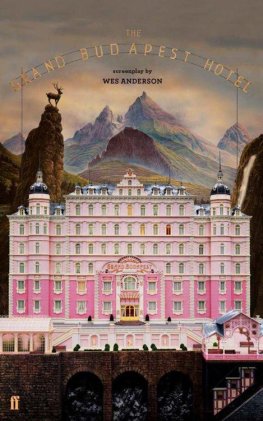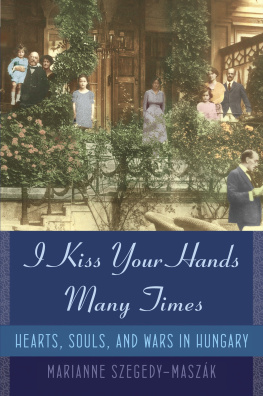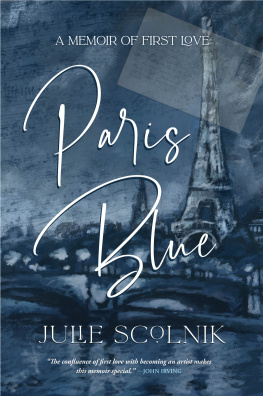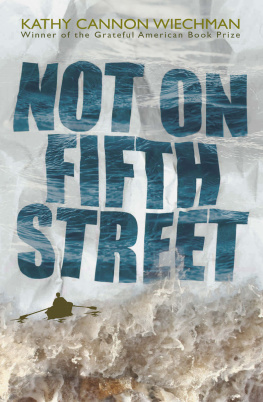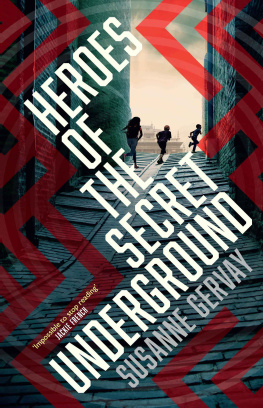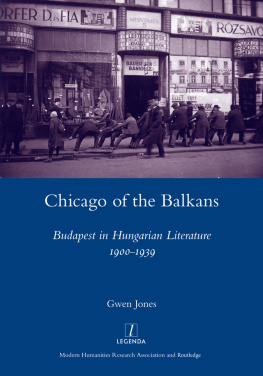ALSO BY JULIE ORRINGER How to Breathe Underwater

For the Zahav brothers
O tempora! O mores! O mekkora nagy cresz .
O the times! O the customs! O what tremendous tsuris. from Marsh Marigold ,
a Hungarian Labor Service newspaper,
Bnhida Labor Camp, 1939 From Bulgaria thick wild cannon pounding rolls,
It strikes the mountain ridge, then hesitates and falls.
A piled-up blockage of thoughts, animals, carts, and men;
whinnying, the road rears up; the sky runs with its mane.
In this chaos of movement youre in me, permanent,
deep in my consciousness you shine, motion forever spent
and mute, like an angel awed by deaths great carnival,
or an insect in rotted tree pith, staging its funeral. Mikls Radnti, from Picture Postcards,
written to his wife during his death march from Heidenau, 1944 It is
as though I lay
under a low
sky and breathed
through a needles eye. W. G. Sebald
from Unrecounted
CONTENTS
PART ONE:
11.
PART TWO:
20.
PART THREE:
25.
PART FOUR:
33.
PART FIVE:
PART ONE
The Street of Schools
CHAPTER ONE
A Letter
L ATER HE WOULD TELL her that their story began at the Royal Hungarian Opera House, the night before he left for Paris on the Western Europe Express. The year was 1937; the month was September, the evening unseasonably cold. His brother had insisted on taking him to the opera as a parting gift. The show was Tosca and their seats were at the top of the house. Not for them the three marble-arched doorways, the faade with its Corinthian columns and heroic entablature. Theirs was a humble side entrance with a red-faced ticket taker, a floor of scuffed wood, walls plastered with crumbling opera posters. Girls in knee-length dresses climbed the stairs arm in arm with young men in threadbare suits; pensioners argued with their white-haired wives as they shuffled up the five narrow flights. At the top, a joyful din: a refreshment salon lined with mirrors and wooden benches, the air hazy with cigarette smoke. A doorway at its far end opened onto the concert hall itself, the great electric-lit cavern of it, with its ceiling fresco of Greek immortals and its gold-scrolled tiers. Andras had never expected to see an opera here, nor would he have if Tibor hadnt bought the tickets. But it was Tibors opinion that residence in Budapest must include at least one evening of Puccini at the Operahz. Now Tibor leaned over the rail to point out Admiral Horthys box, empty that night except for an ancient general in a hussars jacket. Far below, tuxedoed ushers led men and women to their seats, the men in evening dress, the womens hair glittering with jewels.
If only Mtys could see this, Andras said.
Hell see it, Andrska. Hell come to Budapest when hes got his baccalaureate, and in a year hell be sick to death of this place.
Andras had to smile. He and Tibor had both moved to Budapest as soon as they graduated from gimnzium in Debrecen. They had all grown up in Konyr, a tiny village in the eastern flatlands, and to them, too, the capital city had once seemed like the center of the world. Now Tibor had plans to go to medical college in Italy, and Andras, who had lived here for only a year, was leaving for school in Paris. Until the news from the cole Spciale dArchitecture, they had all thought Tibor would be the first to go. For the past three years hed been working as a salesclerk in a shoe store on Vci utca, saving money for his tuition and poring over his medical textbooks at night as desperately as if he were trying to save his own life. When Andras had moved in with him a year earlier, Tibors departure had seemed imminent. He had already passed his exams and submitted his application to the medical school at Modena. He thought it might take six months to get his acceptance and student visa. Instead the medical college had placed him on a waiting list for foreign students, and hed been told it might be another year or two before he could matriculate.
Tibor hadnt said a word about his own situation since Andras had learned of his scholarship, nor had he shown a trace of envy. Instead he had bought these opera tickets and helped Andras make his plans. Now, as the lights dimmed and the orchestra began to tune, Andras was visited by a private shame: Though he knew he would have been happy for Tibor if their situations had been reversed, he suspected he would have done a poor job of hiding his jealousy.
From a door at the side of the orchestra pit, a tall spindling man with hair like white flames emerged and stepped into a spotlight. The audience shouted its approval as this man made his way to the podium. He had to take three bows and raise his hands in surrender before they went quiet; then he turned to the musicians and lifted his baton. After a moment of quivering stillness, a storm of music rolled out of the brass and strings and entered Andrass chest, filling his ribcage until he could scarcely breathe. The velvet curtain rose to reveal the interior of an Italian cathedral, its minutiae rendered in perfect and intricate detail. Stained-glass windows radiated amber and azure light, and a half-completed fresco of Mary Magdalene showed ghostly against a plaster wall. A man in striped prison garb crept into the church to hide in one of the dark chapels. A painter came in to work on the fresco, followed by a sexton bent upon making the painter tidy up his brushes and dropcloths before the next service. Then came the opera diva Tosca, the model for Mary Magdalene, her carmine skirts swirling around her ankles. Song flew up and hovered in the painted dome of the Operahz: the clarinetlike tenor of the painter Cavaradossi, the round basso of the fugitive Angelotti, the warm apricotty soprano of the fictional diva Tosca, played by the real Hungarian diva Zsuzsa Toronyi. The sound was so solid, so tangible, it seemed to Andras he could reach over the edge of the balcony and grab handfuls of it. The building itself had become an instrument, he thought: The architecture expanded the sound and completed it, amplified and contained it.
I wont forget this, he whispered to his brother.
Youd better not, Tibor whispered back. I expect you to take me to the opera when I visit you in Paris.
At the intermission they drank small cups of black coffee in the refreshment salon and argued over what theyd seen. Was the painters refusal to betray his friend an act of selfless loyalty or self-glorifying bravado? Was his endurance of the torture that followed meant to be read as a sublimation of his sexual love for Tosca? Would Tosca herself have stabbed Scarpia if her profession hadnt schooled her so thoroughly in the ways of melodrama? There was a bittersweet pleasure in the exchange; as a boy, Andras had spent hours listening to Tibor debate points of philosophy or sport or literature with his friends, and had pined for the day when he might say something Tibor would find witty or incisive. Now that he and Tibor had become equals, or something like equals, Andras was leaving, getting on a train to be carried hundreds of kilometers away.
What is it? Tibor said, his hand on Andrass sleeve.
Too much smoke, Andras said, and coughed, averting his eyes from Tibors. He was relieved when the lights flickered to signal the end of the intermission.
After the third act, when the innumerable curtain calls were overthe dead Tosca and Cavaradossi miraculously revived, the evil Scarpia smiling sweetly as he accepted an armload of red rosesAndras and Tibor pushed toward the exit and made their way down the crowded stairs. Outside, a faint scattering of stars showed above the wash of city light. Tibor took his arm and led him toward the Andrssy side of the building, where the dress-circle and orchestra-floor patrons were spilling through the three marble arches of the grand entrance.



